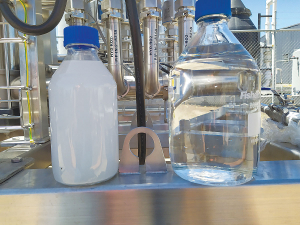Top nutritionals exporter seeks growth capital
New Zealand manufacturer of nutritional and wellness products, NIG Nutritionals (NIGN), is seeking capital to help it meet strong demand from China and wider Asian markets.
 A company claims to have a world-first technology that delivers clean water from the processing of milk and milk products.
A company claims to have a world-first technology that delivers clean water from the processing of milk and milk products.
A South Auckland milk processor is taking part in a world-first project that delivers clean water from the processing of milk and milk products.
NIG Nutritionals has been working with clean technology company Hydroxsys during the past 12 months to deliver the technology. Since January this year, NIG has been trialling Hydroxsys equipment at its facility at Paerata, south of Auckland.
Hydroxsys chief executive Mark Hartstone says the company has developed proprietary "world first" filtration technology that challenges current clean in place (CIP) and waste treatment systems, not only in dairy, but also wider food and beverage manufacturing and industries like wastewater and mining sectors.
For now, he says, Hydroxsys is focusing on food and beverage (including dairy) manufacturing. Water is a key resource in the manufacturing of all food products and specifically milk products.
The plant at NIG Nutritionals will be complete in about four months and will also be used to demonstrate Hydroxsys' technology to potential customers.
NIG Nutritionals chief executive Chris Macbeth says liquid milk processing activities generate liquid waste products that need to be treated prior to discharge under consent from Auckland Council and WaterCare.
“NIG Nutritionals values and ethos are built around nurturing our customers with the best in nutritional solutions,” Chris Macbeth says. “This extends to our environment as we believe that what we put into the environment is what we will receive from it in the future.
“With this in mind, we wanted to find new ways of reducing our environmental impact and improving our contribution to environmental sustainability.”
By introducing the Hydroxsys system, NIG Nutritionals substantially improves the quality and cleanliness of its wastewater discharge.
“We can effectively reduce our ‘waste’ and return up to 90% of the wastewater volume back to our system as a source of clean water,” Macbeth says.
“Further work will be required to provide assurances that this clean water is able to be recycled back into our manufacturing plants or returned to the environment to replace the water that we take from the aquifer. However, we are very confident, based on the results we have gathered over many months of trials, that we can deliver clean water from our manufacturing processes.”
Former Fonterra executive Alex Turnbull has been appointed CEO to lead all five Yili Oceania Business Division companies in New Zealand.
Fonterra executive René Dedoncker is leaving the co-operative later this year to lead Australian agribusiness Elders.
Alliance Group and the Southland Stags rugby team have joined forces in a partnership that will see the the meat co-operative's farmgate brand feature on players' team kits and replica jerseys.
Fonterra's plan to expand its organic programme to the South Island is being well received by farmers, the co-op says.
Voting has started for the renewal of DairyNZ's milksolids levy.
The most successful catchment groups in NZ are those that have 'a source to sea' approach.
OPINION: A dairy version of fantasy football has been launched.
OPINION: In recent weeks beaches in Auckland, Wellington and Christchurch have been unsafe to swim in because of recent heavy…